Introduction
- Alzheimer’s – a dementia type affecting memory, thinking and behavior.
- A progressive degenerative disease.
- Usually affects elderly (over 65) (Alzheimer’s Association, n.d.).
- Prevalence is 5.7 million in the U.S.
- No cure present as of 2019.
- Paramount to research to enhance living conditions, delay symptoms progression, find cure.
Alzheimer’s disease is a progressive degenerative disorder that causes a deterioration of mental and cognitive abilities. Its usual onset begins at senior age and with time makes a person more and more dependent. As of now, there is no way to avert the disease and available treatment options can only slow down its progression and relieve a patient from symptoms. It is pivotal to review and research this disorder further in order to acquire more knowledge about its mechanics and finally cure it.
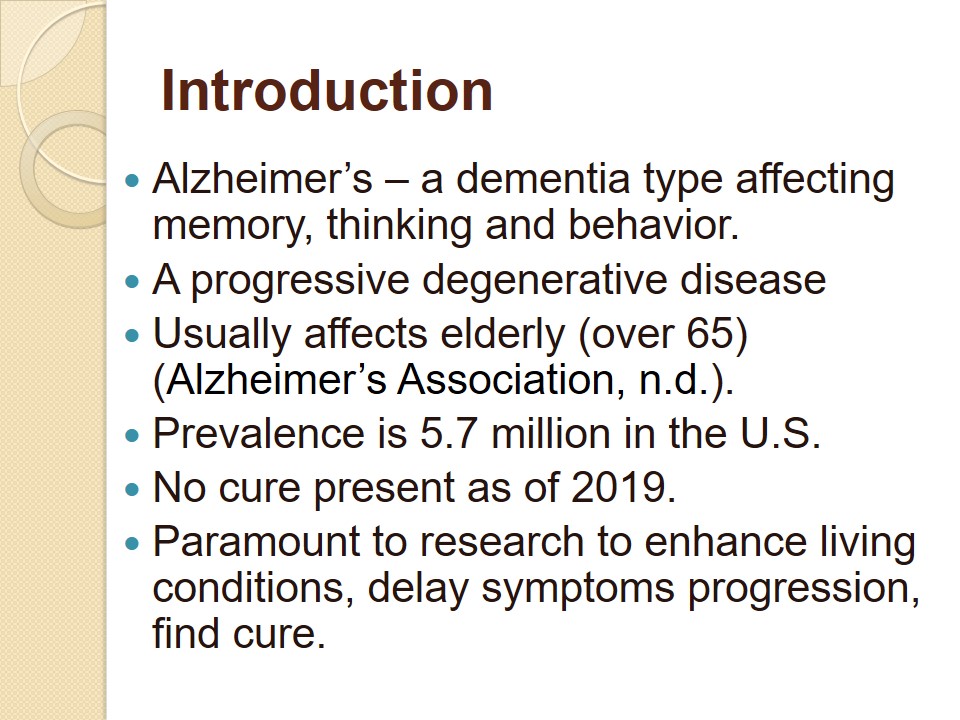
Diagnostic Procedures
- Medical History Review.
- Neurological examination.
- Mental status evaluation (MMSE, Mini-Cog) (Karin et al., 2014).
- FDA-Cleared computerized examination (Cantab Mobile, Cognigram, and so on).
- Genetic Testing (APOE-e4).
- MRI and CT scans.
Present research and practice offers a vast variety of techniques to diagnose Alzheimer’s disease and proneness to its development. Currently, the abnormal loss of cognitive ability (such that is not part of a normal aging process) may be revealed by tests such as mini-cog or MMSE. They combine tasks on remembering and reproducing meaningful information to uncover signs of impairment. Among other diagnostic procedures there are brain scans, and electronic memory assessment tools such as Cantab. Genetic testing, despite some controversy can also be a valid method of confirming an Alzheimer’s diagnosis.
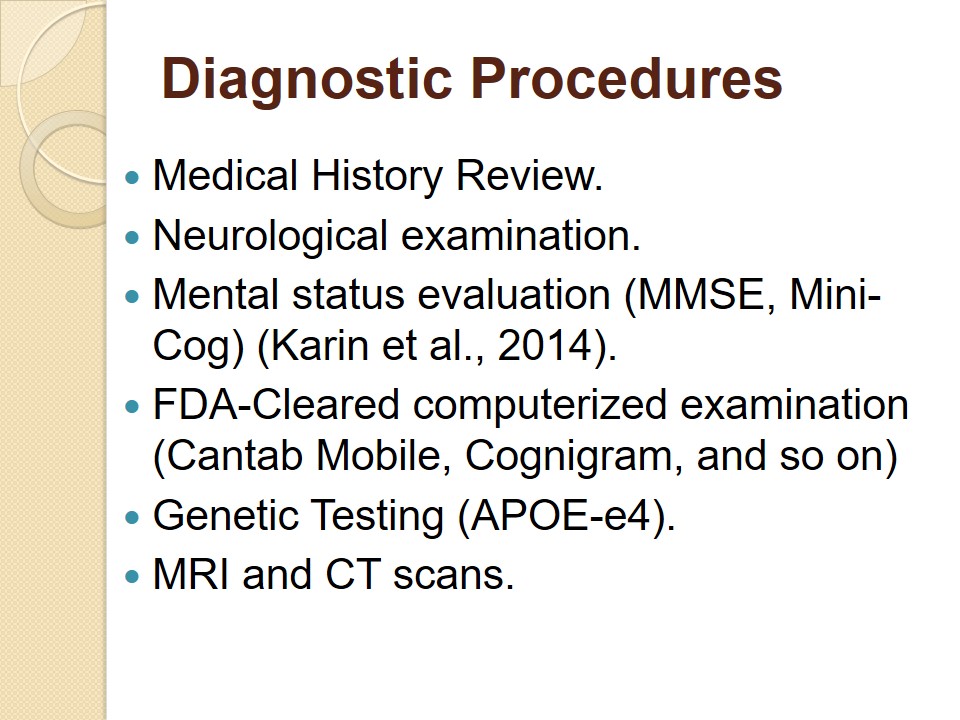
Diagnostic Assessment Scales
- ADAS-Cog – drug response measurement.
- Neuropsychological Test Battery – drug response measurement.
- Global Deterioration Scale (7 stages) – general progression measurement.
- Wechsler Memory Scale – assessment of different memory functions.
When the presence of Alzheimer’s is established, there is also a need to continuously evaluate the progression of the disease and monitor its stage. The latter can be achieved through Global Deterioration scale that helps care providers and family elicit a proper response. Other diagnostic interventions mentioned on the slide are designed chiefly for health care professionals to adjust treatment and control disease progression. ADAS-Cog, as well as neuropsychological test battery (which is a combination of tests), is frequently used in research and testing of new medicine designed to relieve Alzheimer’s symptoms. There multiple other assessments for professional to choose from and they are mostly assigned individually to suit a particular patient and the peculiarities of his or her condition.
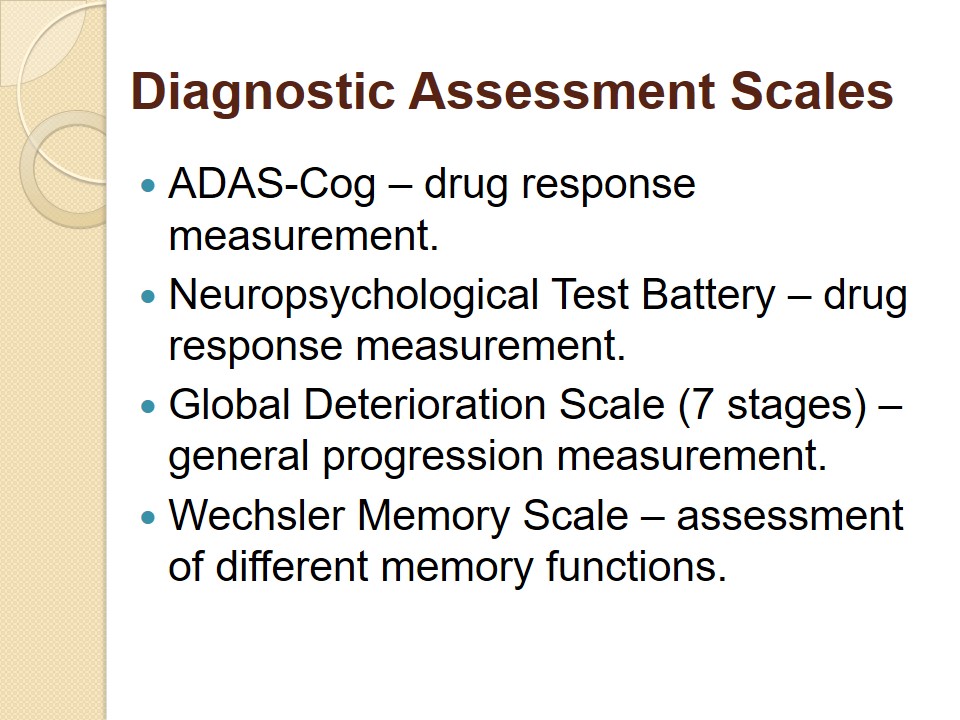
Genetic Variables
- APOE-e4 gene = higher risk of developing Alzheimer’s (late onset).
- APOE-e4 – unreliable and somewhat controversial marker.
- Early Alzheimer’s is heritable.
- Gene mutations affecting early Alzheimer’s – APP, PSEN1, PSEN2.
- Further studies required.
- More than one gene is at interplay in Alzheimer’s development (National Institute on Aging, 2017a).
There is certain evidence that a presence of certain genes such as APOE could predict the development of Alzheimer’s. Yet, NIA suggests that there might be other genes besides APOE-e4 that might also be responsible for the disease onset. This does not allow to use APOE-e4 as a 100% standalone marker of Alzheimer’s. Scientists have established that early Alzheimer’s is heritable and there is a certain number of genes that can predict it. Despite the convincing evidence of the latter, there is still ongoing research that will allow to enhance genetic tests’ precision and uncover the nature of this condition.
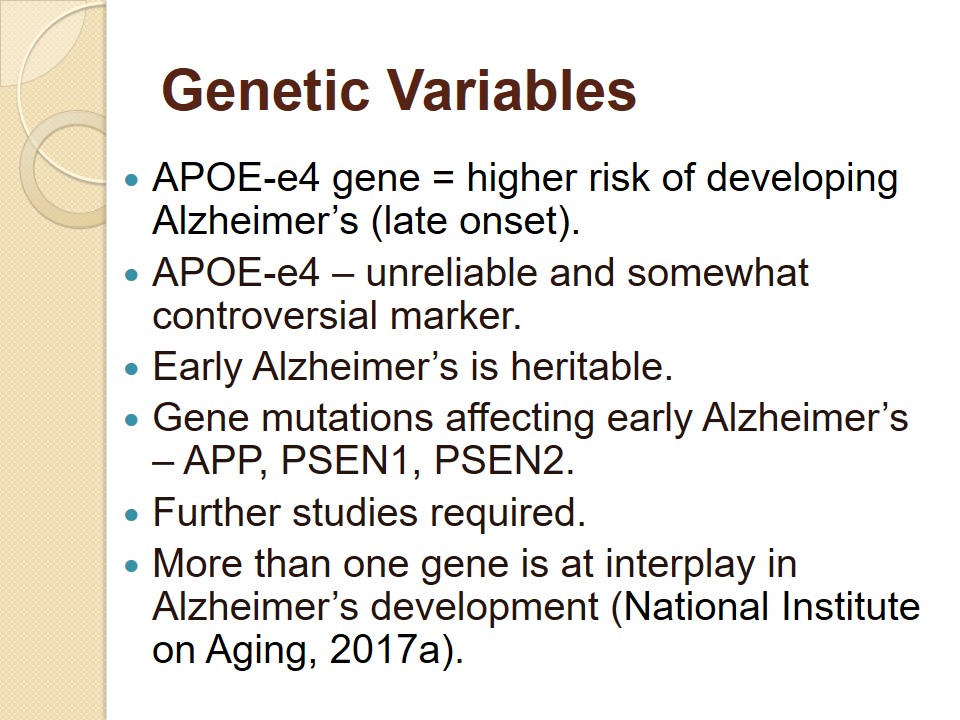
Treatment
Treatment goal: deter symptoms, set back cognitive deterioration, improve life quality.
- Pharmacological interventions:
- Cognitive symptoms treatment (cholinesterase inhibitors, donepezil)
- Behavioral symptoms treatment (citalopram, psychostimulants, antidepressants) (Rabins, Rovner, Rummans, Schneider, & Tariot, 2014).
- Psychosocial interventions:
- home-based exercise
- group exercise
- walking program
- reminiscence therapy (Duan et al., 2018)
- No conclusive evidence on best method, every case is individual (Rabins et al., 2014).
- Alternative interventions:
- Combinatory treatment.
As it was mentioned earlier, there is no medication or procedure that could 100% avert the symptoms and stop the onset of the disease. Therefore, all presently available treatments focus on symptom relief, and quality of life preservation. Among pharmacological interventions, there are cholinesterase inhibitors and donepezil which are moderately effective against cognitive deterioration. Yet, they prove to be effective at earlier stages (Rabins et al., 2014). There is also a minor effect of medications on behavioral symptoms of Alzheimer’s. Academics note that the regular intake of these drugs could induce severe heart conditions and a range of other unpleasant side-effects.
Apart from pharmacological interventions scholars suggest that there is an effect from psychosocial treatment. As such, the ones listed on the slide are found to be demonstrating positive results in terms of symptom relief, but their application depends heavily on individual properties of Alzheimer’s progression. Nonetheless, there is evidence of psychosocial interventions to improve social functioning, adaption, and cognitive function maintenance. Unfortunately, their usefulness for later stage Alzheimer’s is at the very least questionable. Combinatory treatment presently is a prominent study branch that researches the effectiveness of several interventions including both pharmacological and psychosocial ones. Yet, notions of uncertain efficacy are still present.
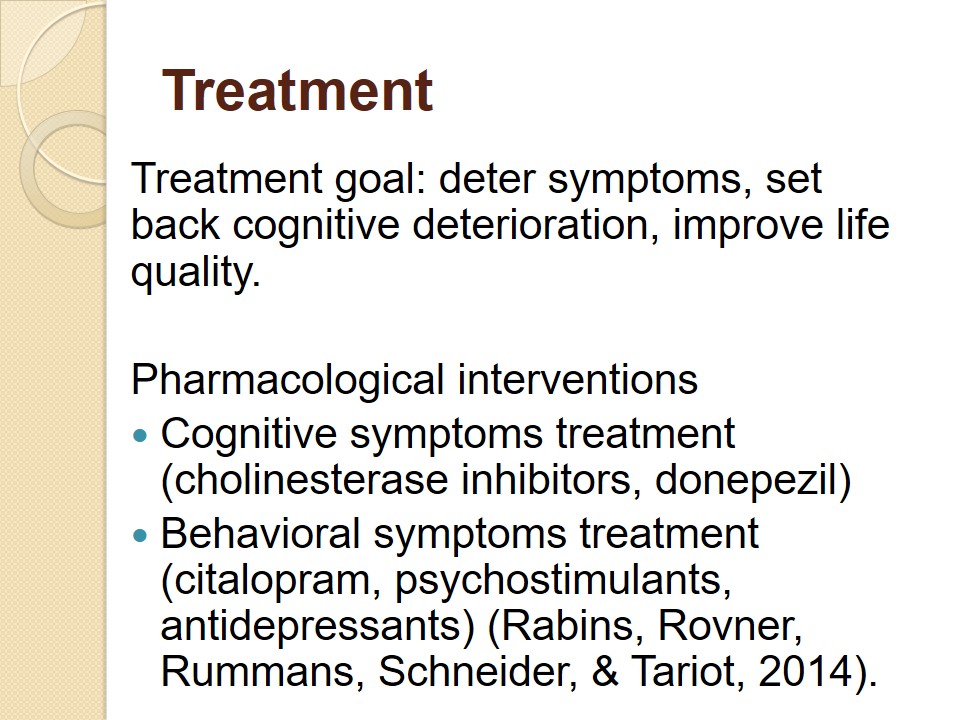
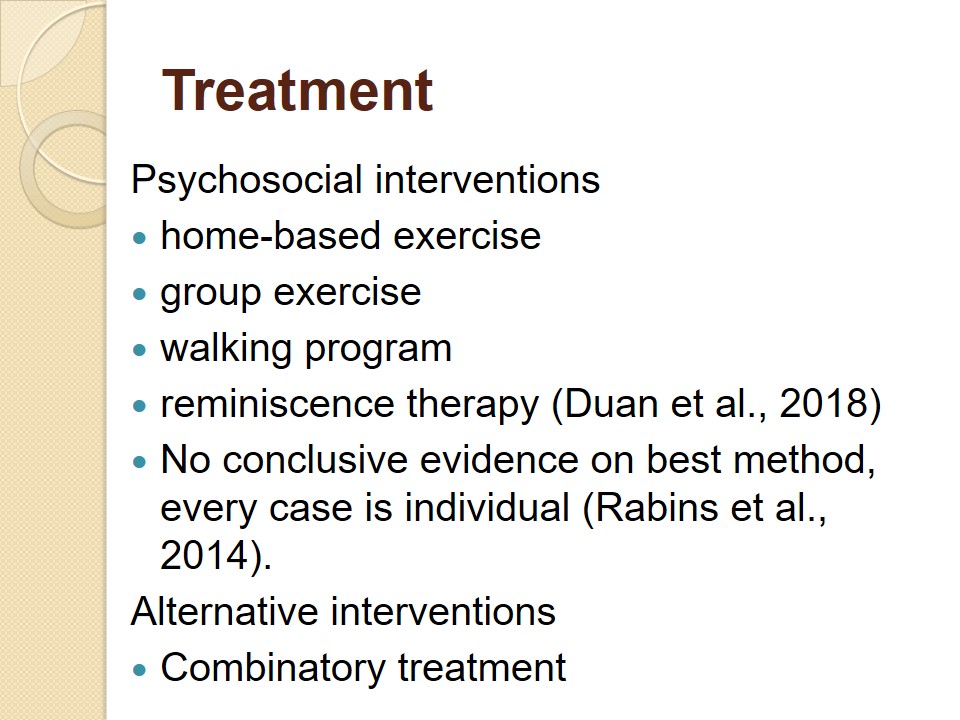
Care Delivery
- Focus on reduction of frustration and agitation (National Institute on Aging, 2017b).
- Pay attention to Family and close individuals.
- Create safe environment.
- Exercise a tailored approach to care.
Care procedures for patients suffering from Alzheimer’s are usually centered on reducing frustration and agitation. Due to the fact that easy tasks became more difficult and required more physical and emotional resources from a patient, there is a need for scheduling changes and allocation of additional time for them. The safe environment needs to be established to prevent accidents as the motor functions may deteriorate as well. Symptoms experienced by each individual are dissimilar, and the use a tailored approach is paramount to address the specific needs of a patient. Along with the growing dependency of an individual suffering from Alzheimer’s, there is also a need for family education that would communicate the basic care needs and ways to tend to them.
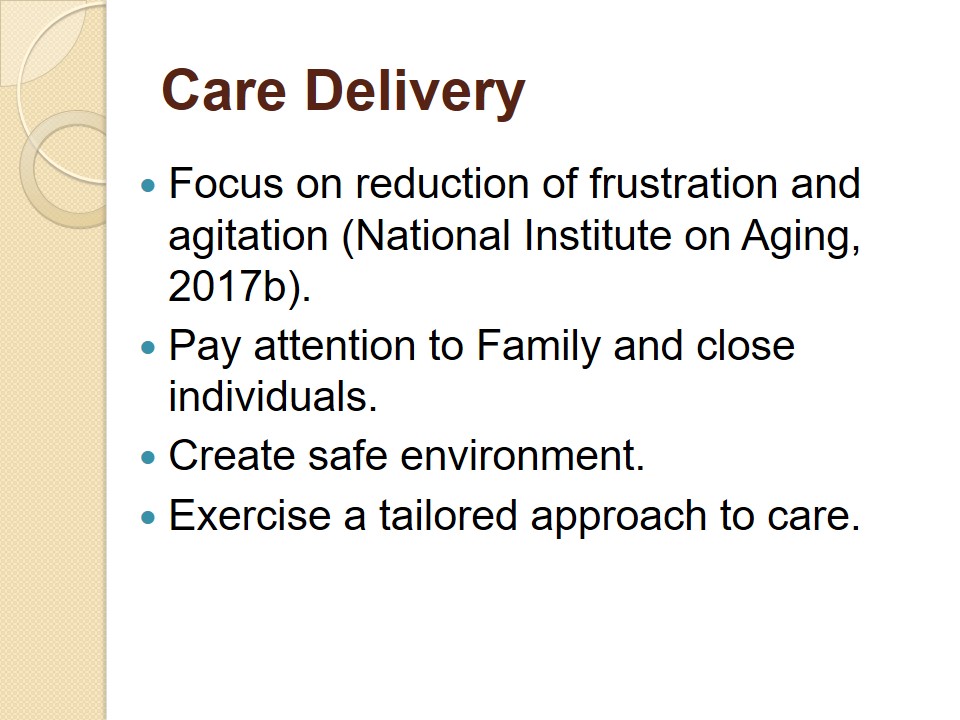
Conclusion
- Primarily old-age disease.
- A variety of accurate diagnosis procedures.
- Treatment options serve mostly as symptom relief.
- Pivotal role of a nurse in delivering care.
- Need for further research.
All things considered, Alzheimer’s disease is a frustrating condition that is often seen in the senior population. Its causes are not largely known, and the genetics cannot yet explain its nature. Despite that fact, there is plenty of health care instruments to make the life of an Alzheimer’s patient as comfortable as possible. They include medications, psychosocial and combinatory interventions that can help relieve symptoms. Nurses are essential personnel in the process of Alzheimer’s management as they can offer mental and physical aid to patients and their families. Hopefully, continuous research will shed light upon this condition and uncover a cure for it.
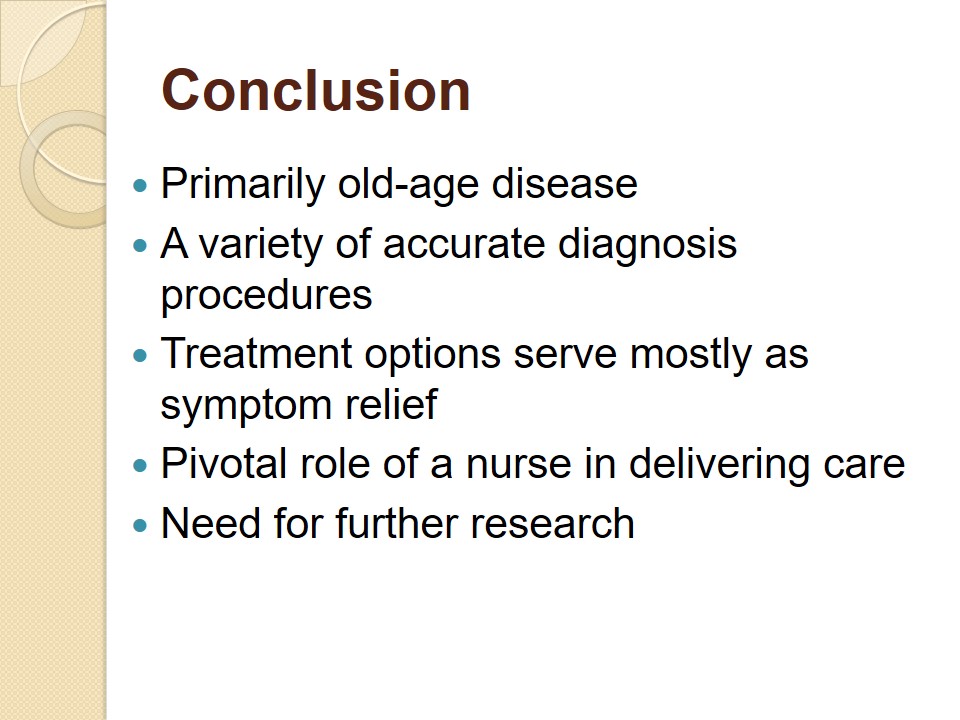
References
Alzheimer’s Association. (n.d.). What Is Alzheimer’s? Web.
Duan, Y., Lu, L., Chen, J., Wu, C., Liang, J., Zheng, Y., … Tang, C. (2018). Psychosocial interventions for Alzheimer’s disease cognitive symptoms: A Bayesian network meta-analysis. BMC Geriatrics, 18, 175.
Karin, A., Hannesdottir, K., Jaeger, J., Annas, P., Segerdahl, M., Karlsson, P., … Miller, F. (2014). Psychometric evaluation of ADAS-Cog and NTB for measuring drug response. Acta NeurologicaScandinavica, 129(2), 114–122.
National Institute on Aging. (2017a). What is Alzheimer’s disease? Web.
National Institute on Aging. (2017b). Managing personality and behavior changes in Alzheimer’s. Web.
Rabins, P., Rovner, B., Rummans, T., Schneider, L., & Tariot, P. (2014). Guideline watch: Practice guideline for the treatment of patients with alzheimer’s disease and other dementias. Web.